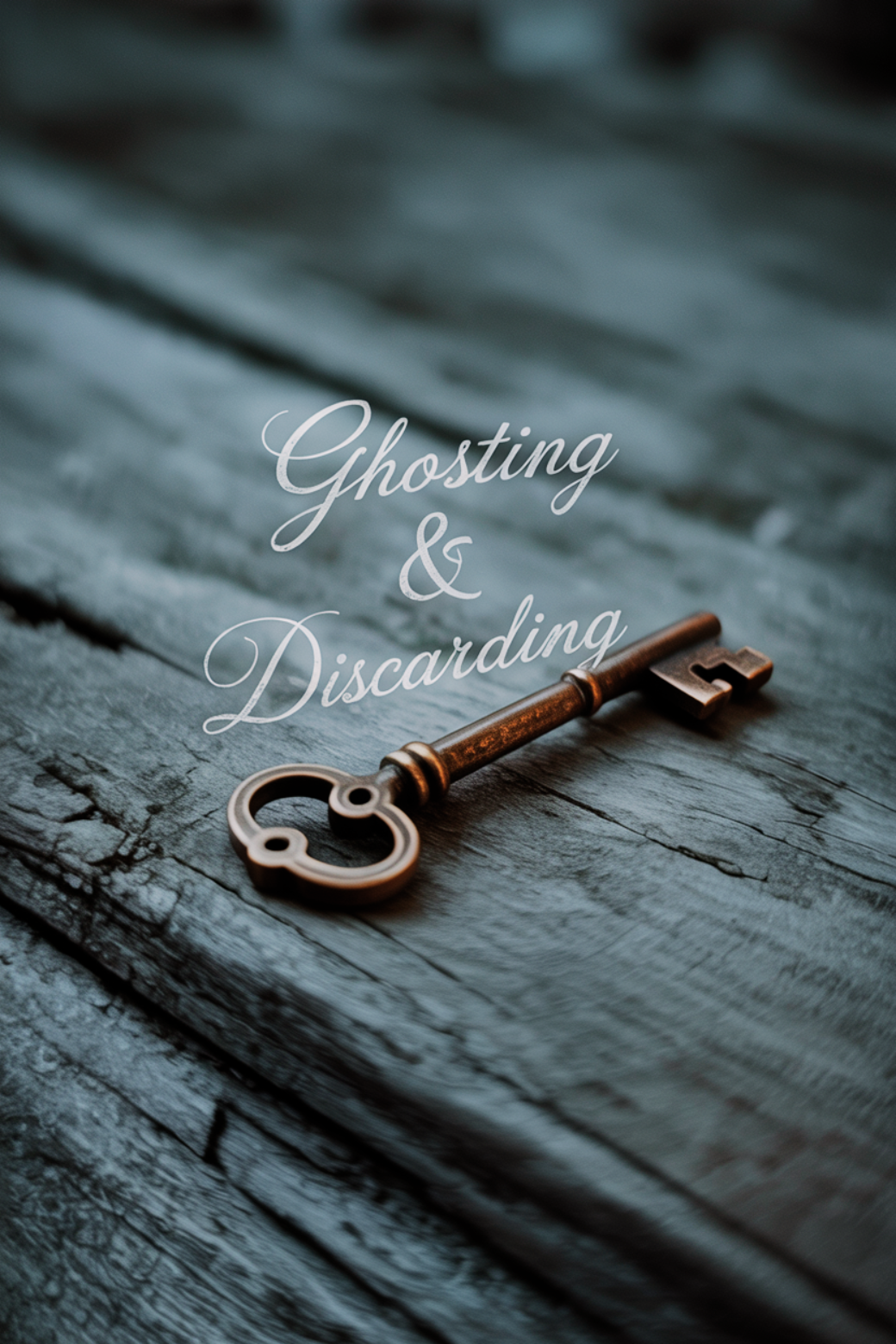Now Reading: Ghosting and Discarding-When Narcissists Vanish to Keep You Hooked (And How to Stop the Cycle)
- 01
Ghosting and Discarding-When Narcissists Vanish to Keep You Hooked (And How to Stop the Cycle)

Ghosting and Discarding-When Narcissists Vanish to Keep You Hooked (And How to Stop the Cycle)
Abuse No MoreNarcissistic TacticsJune 12, 2025
- Home
- Narcissistic Tactics
- Ghosting and Discarding-When Narcissists Vanish to Keep You Hooked (And How to Stop the Cycle)

Ghosting and Discarding-When Narcissists Vanish to Keep You Hooked (And How to Stop the Cycle)
❓Ever had someone disappear without warning—then pop back in like nothing happened?
❓Do you keep blaming yourself for their silence, wondering what you did wrong?
❓Does it feel like every time you get close, they vanish—just long enough to make you chase?
If any of that feels familiar, you’re not overthinking. You’re being emotionally manipulated.
This is ghosting and discarding — the narcissist’s disappearing act, a brutal tactic designed to keep you hooked by confusion, shame, and hope.
But what if you could see it for what it really is?
What if you could stop chasing, stop waiting, and start healing?
In this article, you’ll learn exactly how the narcissist uses silence to control you, how it affects your nervous system, and how to break the cycle using the IMC Method™ — your personal power move to end emotional whiplash for good.
The Issue: Ghosting and Discarding Isn’t Just Rude — It’s a Weapon of Control
Ghosting and discarding aren’t random, accidental, or because they “forgot.”
They’re deliberate silence drops. Strategic vanishings. Emotional control disguised as “space.”
One moment they’re pouring attention into you — texting, calling, making plans, saying things like:
“You’re the only one who gets me.”
“I’ve never felt this way before.”
“We’re so connected.”
Then? Nothing.
No explanation. No call. No response.
And when they finally reappear?
It’s with arrogance, indifference, or passive-aggressive blame:
“I was busy. Why are you freaking out?”
“You’re too sensitive.”
“I just needed space.”
But here’s the truth:
Narcissists ghost and discard not to leave — but to see if you’ll come chasing after them.
They use your need for connection, closure, and consistency against you.
Why It Works:
Because you’re human. You want resolution. You believe people should communicate when something’s wrong.
You think, “If I just explain myself, maybe they’ll come back.”
But that’s the trap.
Ghosting and discarding turns your natural empathy into a leash — pulling you back toward someone who never intended to stay.
🛠️ IMC Method™ Breakdown – How to Escape the Ghosting & Discarding Cycle
The narcissist disappears not because they’re overwhelmed or confused—but because silence is a weapon. And the only way to disarm it?
Use the IMC Method™ — a 3-part strategy designed to:
Expose the manipulation.
Cut off its emotional power.
Rebuild your internal authority.
Let’s break it down.
✅ I – IDENTIFY: This Is a Tactic, Not a Mystery
This isn’t bad communication. It’s control.
The moment you start obsessing about where they went, what you did wrong, or how to fix it—you’re in the trap.
So stop asking, “Why would someone do this to me?” and start asking, “What power are they trying to gain?”
💡 Red Flag Checklist:
Do they only disappear when you ask for clarity, intimacy, or accountability?
Have they ghosted you before—and returned like nothing happened?
Do they act annoyed or bored when you express hurt?
If the answer is yes, you’re not being “ignored”—you’re being trained.
They want you to:
Accept distance as normal.
Apologize for asking questions.
Panic when they withdraw.
🔥 The Shift: Name it. Out loud or in writing.
“This is ghosting as punishment, not healthy space.”
✅ M – MINIMIZE: Starve the Pattern of Attention
Ghosting works because you wait.
You check your phone. You reread old messages. You tell yourself, “Maybe something happened. Maybe they’ll explain.”
That need for closure becomes fuel for the cycle.
But closure from a narcissist?
It’s bait. A performance. A chance for them to twist the narrative and make you grateful they came back.
Here’s how to cut the cord:
Don’t text, “Are you okay?”
Don’t post something cryptic hoping they’ll notice.
Don’t explain what they already know.
💬 Replace this:
“Why did you ghost me? I just want to understand.”
With this:
“I don’t engage with people who disappear and reappear when it suits them.”
You’re not being cold—you’re being clear.
Because every breadcrumb you pick up justifies the next discard.
✅ C – CONTROL: Build a No-Reentry Policy
The ghost always comes back.
Why? Because they assume the door’s still open.
You must make sure it’s locked.
🔒 Your Control Checklist:
Block or mute them if they repeatedly disappear.
Don’t accept vague re-entries (“Hey stranger…” “Missed you…” “What’s up?”).
If they return, treat their silence like a dealbreaker—not a drama to decode.
💬 Try This:
If they message you after disappearing for days or weeks:
“We don’t reconnect after disappearances. That’s not how I do relationships.”
You don’t owe them softness. You owe yourself safety.
📌 Bottom Line:
If you can’t rely on their presence, you don’t need their return.
7 Consequences of Not Breaking the Ghosting and Discarding Pattern
If you don’t call ghosting and discarding what it is—and act on it—the cost isn’t just emotional. It’s physical. Cognitive. Spiritual.
Here’s what really happens when you normalize this narcissistic power play:
1. You Lose Trust in Your Own Memory
You start second-guessing yourself:
“Did I imagine how close we were?”
“Maybe I was too intense…”
“Maybe I misread the vibe?”
❌ Reality Check: You didn’t misread anything.
You were manipulated, then ghosted—so they could control the narrative and your confidence.
💥 Consequence: Your trust in your own perception erodes. And when that goes? Everything feels like quicksand.
2. You Become Hypervigilant
Every silence becomes a siren:
You jump when the phone buzzes.
You replay every convo to look for “mistakes.”
You check their status, but won’t admit it.
This isn’t insecurity—it’s trauma programming.
💥 Consequence: Your nervous system stays stuck in fight-or-flight. You feel anxious even when nothing’s wrong. You live in pre-abandonment mode.
3. You Accept Breadcrumbs as a Meal
They come back with:
A dry “what’s up?”
A late-night emoji.
A recycled excuse…
And suddenly, you’re back in.
Not because it’s fulfilling—but because it’s something.
💥 Consequence: Your standards shrink. You start settling for scraps—thinking they’re affection.
4. You Silence Your Own Needs
You begin editing yourself:
Don’t ask where they’ve been.
Don’t express sadness.
Don’t be “too much.”
Why? Because you’re terrified that honesty = another disappearance.
💥 Consequence: You start erasing parts of yourself just to keep the connection. But connection without authenticity isn’t love—it’s performance.
5. You Feel Addicted to the Unpredictability
The cycle becomes its own drug:
Disappear
Crave
Reappear
Relief
This creates a trauma bond—your brain equates relief with intimacy, not safety.
💥 Consequence: You mistake the intensity of return for the depth of the relationship. You confuse pain with passion.
6. You Lose Time, Energy, and Sanity
Every ghosting cycle steals:
Hours spent wondering.
Days waiting for closure.
Weeks re-regulating your emotions.
💥 Consequence: Your life starts revolving around someone who isn’t even present. Your healing stalls. Your peace disappears—just like they do.
7. You Start Thinking You’re the Problem
They ghost → you get hurt → they blame you for reacting.
You start internalizing the story:
“Maybe I am too sensitive…”
“Maybe I did push them away…”
💥 Consequence: You lose the plot of what really happened. They become the narrator. You become the character who’s always to blame.
📌 Final Word on Consequences:
Every time you excuse ghosting, you teach your nervous system that love is unstable, unpredictable, and unsafe.
That’s not love. That’s trauma training.
🛠️ 7 Recovery Tools
These trusted tools will support your healing journey around ghosting and discarding. Each resource is external to empower you independently — no fluff, just real support.
1. Book – Attached: The New Science of Adult Attachment and How It Can Help YouFind – and Keep – Love by Amir Levine & Rachel Heller
Teaches how attachment styles influence response to abandonment and rejection — essential when dealing with disappearing partners.
👉 Find it on Amazon:
2. Worksheet – Break the Breadcrumb Cycle Planner
Practical PDF helps you track ghosting patterns and create a self-care strategy to break free.
👉 Download PDF:
https://midlifecrisiscafe.com/wp-content/uploads/2020/04/Ghosted-Worksheet-Breaking-the-Cycle.pdf
3. App – ReGain: Online Relationship Counseling
Affordable, therapist-mediated support designed specifically for relationship recovery — includes crisis planning and communication tools.
👉 ReGain info:
https://www.regain.us/
4. Online Article – Psychology Today: “Why Ghosting Harms You—and How to Stop Replying”
Journalistic, expert-backed explanation of the emotional toll of ghosting—and practical self-defense suggestions to stop engaging.
👉 Read it here:
https://www.psychologytoday.com/us/blog/mindful-anger/202005/why-ghosting-harms-you-and-how-stop-replying
5. Crisis Support – National Suicide Prevention Lifeline / 988
If the disappearances or trauma triggers escalate to crisis levels, call or text 988 (U.S.); available 24/7 for emotional support and intervention.
👉 Learn more:
If you need to talk, the 988 Lifeline is here.
6. Online Support Group – Meetup.com: Emotional Wellness (Mobile, AL)
In-person community support, perfect for integrating recovery in real-world context and reducing isolation.
👉 Find events & join:
https://www.meetup.com/topics/emotional-wellness/mobile-al/
7. Guided Meditation – UCLA Mindful Awareness Research Center (Podcast)
Free guided audio meditations to help regulate your nervous system after triggers — ideal post-ghosting self-care.
👉 Tune in here:
https://www.uclahealth.org/marc/mindful-meditations
✅ How to Use These Together
Tool | Purpose | When to Use |
|---|---|---|
Attached (Book) | Learn attachment triggers | Before/after therapy sessions |
Ghosting Worksheet | Map out cycles | After painful disappearances |
ReGain App | Professional support | When relationships feel out of control |
Psychology Today article | Get clarity & boundaries | When ghosting feels “normal” |
988 Hotline | Crisis intervention | In moments of overwhelming distress |
Local Meetup | Human connection | To rebuild trust in people |
UCLA Meditations | Regulate nervous system | Any time you feel emotionally flooded |
🎙 Survivor Insight
“That ghosting worksheet helped me spot the pattern before I drowned in my phone waiting.”
“UCLA meditations were the first time I didn’t feel trapped in my head after a ‘hey stranger’ text.”
🔚 Final Word on Tools
This isn’t just a toolkit — it’s a recovery blueprint. For your mind, heart, and nervous system. Use each one as needed. You deserve support that meets you where you are, not where they left you.
💬 Eve Asks You – Reflective Quiz
Take your time. These questions aren’t about right or wrong—they’re about getting honest with yourself. Print them. Journal them. Speak them aloud. But most of all? Answer them like nobody’s watching.
1. When they disappeared without warning, what did you tell yourself it meant about you?
Did you assume it was your fault? That you were too much, too needy, too emotional? Or did a part of you know… their vanishing act was never about you at all?
2. How many chances have you given them after silence—just to keep the connection alive?
Be honest: how many times did you reopen the door they slammed shut? And how did it feel afterward?
3. Do you believe people who love you… disappear when it’s inconvenient to care?
Not what you hope. Not what you’ve accepted. But what you truly, in your bones, believe is love.
4. What part of you still waits for them to return—and why?
It could be the hopeful part. The wounded part. The part that doesn’t want to start over again. But is that part protecting you—or keeping you stuck?
5. What boundaries have you set to protect yourself from the next discard?
Did you block them? Unfollow? Journal your dealbreakers? Or are those boundaries still more theoretical than tactical?
6. If they texted you today—“Hey, you good?”—how would you respond?
And more importantly: would your response reflect your healing… or your hope that maybe this time, they’ve changed?
7. What would it look like to choose consistency, clarity, and kindness—instead of chaos, silence, and crumbs?
You know what ghosting feels like. What would real connection feel like? Are you ready to find out?
✨ Reminder from Eve
Every time you answer truthfully, you reclaim a little more of your power. You don’t have to chase someone who disappears. You don’t have to prove your worth to someone who ghosts you.
You are not disposable.
This was never about being lovable. It was about being available to someone who was never capable.
Let that sink in.
🧠 What You Learned
Ghosting & discarding isn’t random. It’s not “just how they are.” It’s not some harmless habit or a communication quirk. It’s a manipulation tactic, used by narcissists and emotional abusers to keep you in a loop of confusion, self-blame, and desperate attachment.
Here’s what you now know, without a shadow of a doubt:
🔹 Ghosting isn’t about needing space. It’s about control. The narcissist disappears to punish you, test your loyalty, or keep you emotionally destabilized.
🔹 Discarding isn’t a breakup. It’s a performance—meant to make you feel disposable and dependent, while leaving the door open for their eventual return.
🔹 The return is never an apology. It’s a power check. They come back not because they’ve changed, but to see if you have—specifically, if you’ve dropped your boundaries.
🔹 You’re not needy, dramatic, or overreacting. You’re reacting to someone who treats your nervous system like a yo-yo.
🔹 The IMC Method™ gives you the tools to cut the string. You identify the pattern. You minimize the chaos. You take control of your space, your dignity, your peace.
🔹 Closure doesn’t come from them. It comes from clarity. From choosing to believe yourself over their silence, and protect yourself rather than prove yourself.
🔹 Every time you hold your boundary, you rewrite the story. And this time? The ending is in your hands.
You learned how to:
Spot the tactic.
Name the behavior.
Break the cycle.
Rebuild your self-trust.
Protect your emotional landscape with boundaries that don’t budge.
This wasn’t about making them see your worth.
It’s about finally seeing it yourself—and never letting anyone treat it like an option again.















